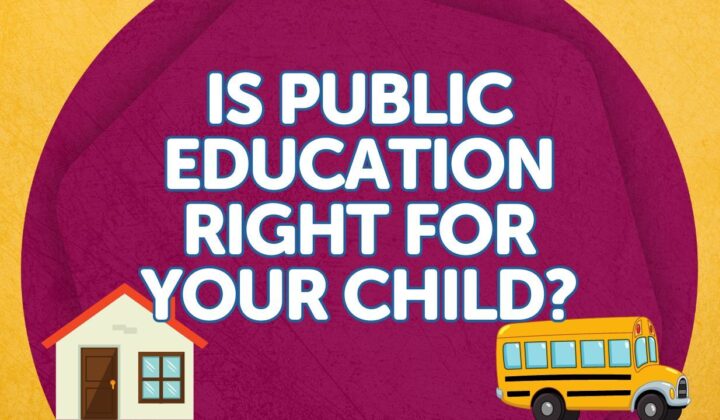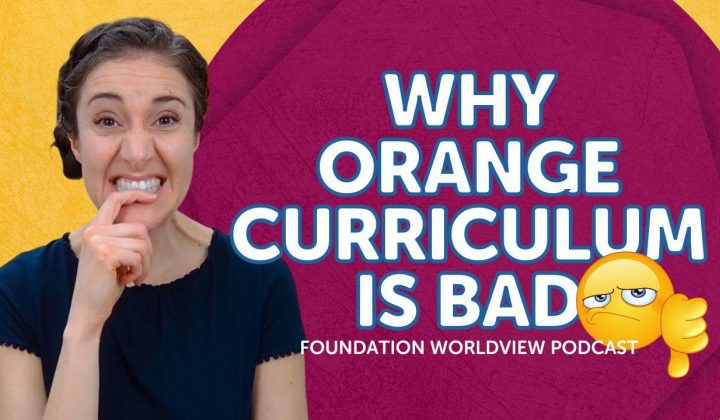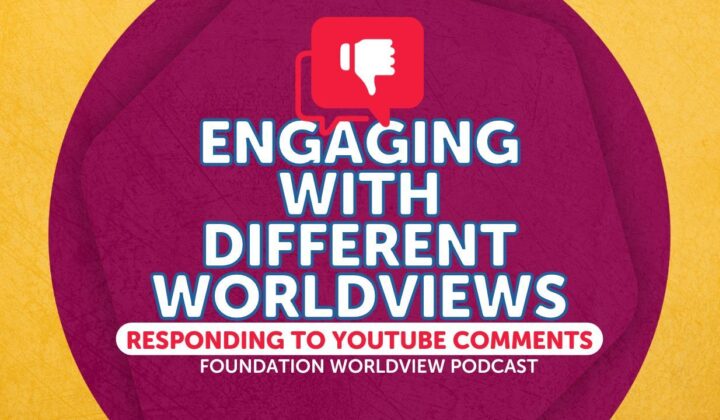Learn more about the journey that led to us equipping kids to carefully evaluate every idea they encounter.
Meet members of our team who have contributed to curriculum development.
Hear from real users of the Foundation Curriculum.
Learn what we believe about God, Jesus, Scripture, and more.
Is Christian Homeschool Curriculum Best?
Today's question is, "Would you recommend only a Christian worldview curriculum for a homeschooling family? I'm afraid if I followed only Christian curriculum, I would be sheltering my children and not preparing them enough to reject secular worldviews when they get older.
Transcript
Note: The following is an auto-transcript of the podcast recording.
Hello friends, and welcome to another episode of the Foundation Worldview podcast where we seek to answer your questions so that you can equip the children that God has placed in your care to carefully evaluate every idea they encounter and understand the truth of the biblical worldview. I'm your host, Elizabeth Urbanowicz, and I'm thrilled that you've joined me for another episode today. Today's question says, "Hi Elizabeth. Would you recommend only Christian worldview curriculum for a homeschooling family? I'm afraid if I do only Christian curriculum, I would be sheltering my children and not preparing them enough to be able to reject secular worldviews when they get older." This is a really important question and it's actually one that I'm very passionate about because my background is in education.
So we're going to dive down deep into this question today, but before we do that, if you found the content of this podcast beneficial, please invest a few seconds that it takes to rate it, to review it, and also just subscribe to make sure that you don't miss any future episodes. Also, if you have a question that you would like for me to answer on a future Foundation Worldview podcast, you can do that by going to FoundationWorldview.com/podcast.
Now, as I've mentioned, this is a question that I'm really passionate about because I spent the first decade of my professional career as an elementary teacher in a Christian school, and then I spent the next four years after that doing consulting work for Christian schools. And I personally am actually a proponent of using non-Christian curriculum, secular curriculums in both the homeschool and the Christian school setting. And so before anybody freaks out, just be patient. I'm going to explain myself in a few minutes here just why it is that I am a proponent of using secular curriculum in both the homeschool and the Christian school setting.
Now, I want to say that I know that this can be challenging, especially if you are in a homeschool setting because it is mainly Christian publishers and Christian publishing houses that produce homeschool curriculum. So this can be a little bit more challenging in the homeschool setting, but it's still something that is possible and I would encourage you to consider. I promote using secular curriculum in both the homeschool and Christian school setting for two reasons. The first reason is that sadly, and this truly is just I think a tragedy, most Christian curriculums lack the academic rigor that secular curriculums have. That just most Christian curriculums are lacking in this area.
I actually got myself into a little bit of trouble when I first started Foundation Worldview because I just really wanted to encourage people to be very academically rigorous in what we are doing with our children. And back in the days when I was still running Foundation Worldview social media, I created a little meme and then put it out on our social channels, and it got a whole lot of attention and a whole lot of negative attention too. And I had a statement, I don't remember exactly what it was, but it was something to the effect if, if public schools have third graders writing five paragraph essays, why in Sunday school do we have kids gluing cotton balls on sheep? And a lot of Sunday school teachers, I'm sure, very faithful Sunday school teachers got very upset and wrote long paragraphs about why they have kids glue cotton balls on sheep.
But sometimes it's just the Christian view that like, oh, we're shepherding children's souls, which are we doing that? Yes, absolutely, and that's so important, but oh, we're shepherding their souls, so we're just going to more care for them emotionally and shelter them, and we're not going to focus so much on the rigor. Where as Christians, we want to honor God in every aspect of life. And so this should include our studies and what we're doing academically that do we require perfection? Absolutely not. We know our children cannot be perfect, but we want to make sure that we are training them to do everything excellently because we're training them to do it as unto the Lord. And so if you are passionate about using Christian curriculum, I would just encourage you just to make sure that the curriculum you are choosing is as academically rigorous as you can find, because as I said, I know that for homeschoolers it can be difficult to actually find secular curriculum for homeschooling families because most of those producing homeschool curriculum are Christian publishing houses.
Actually, just in a few weeks here, I have a friend who is going to be, again, homeschooling her children next year. And so she and I are traveling to a local homeschool convention in our area so that we can go to the vendor hall and we can check out the curriculums and we can see where they're at and which ones are academically rigorous and what do they contain. So if you're going to use a Christian curriculum, please make sure that it is one that is academically rigorous.
The second reason that I am a proponent of using secular curriculums in both Christian and homeschool settings is we want to prepare our children to be in the world but not of it. And so as this questioner wrote in with this fear of not preparing his or her children to actually be able to understand and then reject the lies that they encounter, I think by implementing non-Christian curriculums, it's a great way to expose our children to some of the things that they're going to be faced with in the world in a situation in which we can still guide them and help them think critically. And so we want to make sure that we are preparing our children to carefully evaluate every idea that they encounter. It is really hard to do this if they never encounter unbiblical philosophies and academic subjects. If they're used to everything being presented from the Christian worldview, there can be an advantage to that and that they're hearing a Christian worldview. But there's a disadvantage as well in that they're just hearing everything from the Christian perspective where they are going to be presented with a non-Christian perspective. I mean, even if we send our children to Christian universities, what they're going to be confronted with in the Christian University classroom is going to be vastly different. It's going to be light years different from what they're presented with in Christian based curriculums.
So what we recommend at Foundation Worldview, how do you do this? How do you actually make sure that we're preparing kids to carefully evaluate these ideas? We're grounding them in the truth while also exposing them to these ideas. What we recommend at Foundation Worldview is first, we need to ground our children in the biblical worldview. They're not going to be prepared to recognize the hollow and deceptive philosophies that they're going to encounter in the world around them if they're not first grounded in the biblical worldview. So first, we need to make sure they understand they have a thorough biblical understanding of what the worldview is presented in Scripture. Then we need to intentionally expose them to the teachings of other worldviews so that they can compare and contrast them with Christianity. And this is where it can be really helpful if we do implement secular curriculums to actually have our kids as they're going through science or math or literature or history, to actually ask them questions about what is presented there.
When I was teaching in a Christian school, we would get a weekly subscription like a weekly reader, just like most kids in elementary schools do. And when I first started teaching third grade, the third grade at my school subscribed to something called God's World News. So it was basically like a Christian version of Scholastic News and we would read through it, and it had a lot of great stories. And if anybody's listening out there who uses God's World News, I'm not saying stop using God's World News. I think it's a great resource. But what I was noticing is that everything was presented from a distinctly Christian perspective. And I talked to my teaching partners and I said, we're not preparing our kids to actually listen to what's presented in the news and evaluate it through a Christian lens. So we actually went to administration that next year and we said, can we subscribe to Scholastic News instead of God's World News? And they allowed us to do that once we explained our reasoning. And then every week as the Scholastic News would come, I would ask my students key questions about what was presented there. Sometimes there would be articles about different animals. And I remember one time there was this article called Chimp Chat, and it was said, humans aren't the only animals that know how to communicate. And we read the whole article and I said, what are they assuming? What is the assumption that they're making in this article about humans? That we are animals, that we are just a more highly evolved form of animal? My students were able to pick up on that after we read through the article. These are the kind of conversations we want to have with kids. And if we want to prepare them to recognize faulty worldview assumptions, they have to be directly exposed to them.
Then we need to teach them skills in careful thinking and practice those skills with both secular material and Christian material, because that's another danger of always using Christian material, that our kids can be under the impression that if anything is written from someone who claims to be a Christian, that that material is automatically true. Where that is just not the case. Number one, any person is a fallen person. So not all of the material that I create, I work really hard to make sure that it's accurate. I have others check it, but I'm a fallen human. So there will be little things here and there that slip in, and then others will have to correct me. So we want to make sure our kids are always carefully evaluating things and holding it up to the light of Scripture. But then there are also people who claim the name of Christ who just are not genuinely following Jesus and promote things that are distinctly unbiblical.
And so whether we're using a Christian curriculum or a secular curriculum with our kids, I would recommend pulling in articles and websites or subscribing to something like the Scholastic News where they're going to be presented with information from a perspective that is distinctly secular. And then together put these skills into practice to have them carefully evaluate, okay, what worldview perspective is this coming from? Is this idea true or is it false? How do we know?
And so one thing I highly recommend that you do is check out our Biblical Thinking Track. At Foundation Worldview, we have three curriculums for kids of different ages. We have our Biblical Worldview Curriculum for kids 4+ our Comparative Worldview Curriculum for kids 8+, and our Careful Thinking Curriculum for kids 10+. And these curriculums are designed to be done once a week for anywhere from a half hour to an hour. And then the skills that kids learn from these curriculums will then be implemented in every other academic subject that they are learning that that is the goal. That's why we create these curriculums. And actually, someone was just asking me the other day, I was kind of chuckling. They said, Elizabeth, if you get married one day and have children of your own, are you just planning on teaching your kids all of these things that you create in curriculums on your own? Or will you actually have your kids sit down in front of these videos and watch you teaching this material? And I thought about it for a minute, and I kind of laughed and I said, if I do get married one day and I have kids of my own, as awkward as this might sound, I will actually have them sit down and watch these curriculum videos and go through them. Because while I know these things, everything that I've taught, if I'm just trying to do it on the fly on my own in these random conversations that I'm having with my kids, there's going to be huge gaps in their understanding where everything in our curriculums has been crafted so that we're going to transform student thinking systematically. So I would still want my children to go through them. So highly recommend that you check out our curriculums at Foundation Worldview because they can really be the foundation for all the rest of the things that you are doing in your homeschool or in your Christian school classroom.
I would also highly encourage you that if you are in the situation where you are picking out curriculum for your children to be very prayerful about it, and also to ask others who are ahead of you on the journey to come alongside you. Find another homeschooling mom or dad who has kids that are a little bit olde than yours. Ask them what curriculums they have used, what things they have done that have been helpful, what things that they have done that they wish they hadn't done. You can really learn a lot and glean a lot of wisdom from others in your church who are ahead of you on the journey. I mentioned before that a friend and I are going to be going to a local homeschool convention to help look for curriculum as she starts to homeschool her children next year. Well, another friend of ours is coming who is a mom who has been homeschooling her children for the past 11 years. And so this mom has so much experience in this area. So she's coming along with us to help us look through these things because she just has experience as a homeschool mom that I don't have, that my other friend doesn't have. So highly recommend that you be really prayerful about this and find others in your church who can help you as you start this journey.
Well, that's a wrap for this episode, but as always, my prayer for you is that no matter the situation in which you and the children God has placed in your care find yourselves, that you would trust that God is working all things together for your good. By using all things to conform you more into the image of His Son. I'll see you next time.
Related Posts and insights

Is Public Education Right for Your Child? What Christian Parents Need to Know
In this episode, we dive into the challenge Christian parents face: preparing children to live out their faith in a secular environment. We explore the strategic approach of establishing a strong biblical foundation in children before they encounter secular viewpoints, particularly within the public education system. Join us as we tackle the question: Can children with a solid biblical theology thrive in public schools? This discussion is crucial for parents contemplating the best educational path for their faith-filled children.

Why Orange Curriculum is Bad
In this eye-opening podcast episode, Elizabeth Urbanowicz analyzes the effectiveness of the popular Orange Curriculum and discusses the pitfalls of proof-texting moral lessons. We'll even look at scripture-based alternatives to Orange Curriculum. Don't miss this essential conversation on transforming kids' ministry for the better!

Engaging with Different Worldviews
In this episode, Elizabeth Urbanowicz responds to comments from a previous episode on talking to children about dinosaurs. She addresses the pushback received from those with different worldviews. Elizabeth then models how to ask good questions when encountering false claims that go against Christianity.





